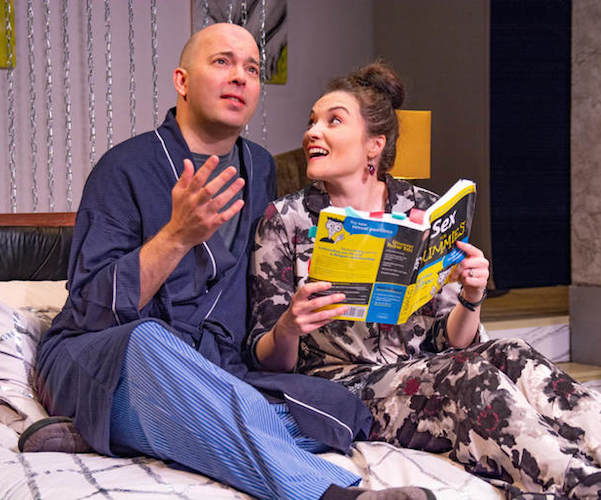Theater Review: “Sexy Laundry” — Cycling Through
Sexy Laundry airs the linen of a twenty-five-year marriage from which the colors seem to have faded, and the whites yellowed.
Sexy Laundry by Michele Riml. Directed by Kenn McLaughlin. Staged by the Peterborough Players, Peterborough, New Hampshire, through September 9.

Tom Frey and Bridget Beirne in the Peterborough Players production of “Sexy Laundry.” Photo: Will Howell.
By Jim Kates
Two weeks ago, in a review of George Bernard Shaw’s Man of Destiny at the Peterborough Players, I wrote strongly of Tom Frey’s disappointing portrayal of a young Napoleon. I am most pleased to say that Frey’s return this week as Henry Lane in Michele Riml’s Sexy Laundry represents the performer’s triumphant return from Elba. The role plays to his strengths, expressions of disgruntlement and indignation, but it also gives him scope to explore a sensitivity and thoughtfulness that are well worth watching. He is well matched — I think the right cliché is that of chemistry — with the comic precision of Bridget Beirne, who plays his wife Alice. Their engagement with each other make the production, directed by Kenn McLaughlin, work.
Sexy Laundry airs the linen of a twenty-five-year marriage from which the colors seem to have faded, and the whites yellowed. Many marriages are in this condition, and therein lies both the strengths and weaknesses of the play. The one-and-a-half-hour one-act comedy reflects — with clever writing and rueful reminiscence — what almost every couple has experienced to a greater degree or another. The primary reaction of the audience to what goes on on stage is recognition. The resolution pleases because it reassures. If none of the dialogue is particularly quotable, none of it feels or falls out of place. It’s all on target.
On the other hand, Sexy Laundry offers nothing new. It does not probe deeply into the personalities of the couple beyond the obvious: Henry has been frustrated and passed over at work, the couple’s children have grown and flown. They are not shown as people with a rich imaginative or emotional life that can be drawn on to enrich their marriage. They quarrel about misunderstandings, but they do not fight with passion. The sexual techniques they strain at (alleged to be the means to rejuvenate their relationship) include massage, role-playing, and talking dirty. These prove as ineffective as Alice’s ludicrously unthreatening dominatrix’s whip.
Such as their history is, so it has to be. And so Riml makes the most of it.
And so Beirne and Frey make the most of their characters. The key moments for both of them are wordless — for Frey’s Henry, when he bursts into a surprisingly exuberant disco dance, which shows both the character and the actor most in tune and rhythm with the larger world. Meanwhile, his Henry also listens to and reacts to Alice with attention and an underlay of care.
Beirne’s key moment was revealed on the first night of the production by an unavoidable glitch which necessitated the repetition of a few important lines in the play, one of whuch involved her revising “I” to “we.” For each take, there was a pause between Alice’s saying “I” and then “we.” The first time, she played it well, and the change in her perspective brought forth both laughter and appreciation from the audience. The second time, she held the pause between the “I” and the “we” a half beat longer, and the effect was palpable in the audience’s even more delighted reaction. This was a rare opportunity to watch a careful actor refine a subtlety in her performance, to dramatize the importance of timing in comedy.
The rest of the run should be as satisfactory.
Jim Kates is a poet, feature journalist and reviewer, literary translator and the president and co-director of Zephyr Press, a non-profit press that focuses on contemporary works in translation from Russia, Eastern Europe, and Asia. His latest book is Muddy River (Carcanet), a translation of verse by Russian existentialist Sergey Stratanovsky. His translation of Mikhail Yeryomin: Selected Poems 1957-2009 (White Pine Press) won the second Cliff Becker Prize in Translation
Tagged: Bridget Beirne, Michele Riml, Peterborough Players, Sexy Laundry

